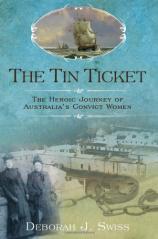Reading Group Guide
Discussion Questions
The Tin Ticket: The Heroic Journey of Australia's Convict Women

1. What universal truths about survival and resilience did you take away from The Tin Ticket? How do these lessons apply to us today? What would you say to your children, or your closest friend, about the strength exhibited by Agnes, Janet, and Ludlow?
2. What surprised you most about this largely unknown piece of women’s history? What did you discover are the greatest misconceptions about the convict women who became the founding mothers of modern Australia?
3. Agnes, Janet, and Ludlow faced difficult choices as they navigated their treacherous path toward freedom. Describe the traits and attributes that you think enabled them to triumph over tragedy. Discuss Ludlow’s struggle and how her decisions were influenced by the fact that she was a mother and that she could read and write.
4. Women’s friendship played an important role in the lives of Agnes McMillan and Janet Houston. Alliances in prison, aboard ship, and at Cascades helped many endure their ordeal. Discuss the ways in which their unshakable “mateship” pulled them through each phase of their incredible journey. How have your close friends influenced important turning points in your life?
5. Humor, ingenuity, and rebellion permeate the story behind The Tin Ticket. How do these themes advance your understanding of how the women managed to thrive and to prosper once they were released from the Cascades Female Factory?
6. What are your thoughts about the Flash Mob and the underground culture that flourished at Cascades?
7. Discuss the differing expectations and norms for women and men in Victorian society? How did life on the goldfields help level those expectations?
8. Elizabeth Gurney Fry was a complex heroine. Why do you think her simple acts of kindness made her such a celebrity? Discuss women’s roles and sphere of influence in the nineteenth century. Compare the outlook of Elizabeth Fry to that of Lady Jane Franklin. Did it surprise you to learn that Quakers were the radicals of the time?
9. As the leader of the reform movement to help convict women, Elizabeth Gurney Fry forced a change in attitude and conditions in prisons around the world. What are your thoughts about the power of one person to effect history?
10. Twenty-five thousand women were transported to Australia to serve as “tamers and breeders.” How does social engineering like this change the course of a nation’s development? In what ways does history, and particularly women’s history, repeat itself? Has reading The Tin Ticket challenged or changed any of your assumptions about crime and punishment?
11. Some historians have suggested that women like Agnes, Janet, and Ludlow were “better off’’ as a result of being transported to Australia. Do you agree or disagree with this conclusion?
12. Deborah Swiss exposes the tension between the powerful and the powerless. What lessons about how a culture is formed did you take away from learning about this largely unknown piece of history?
13. Charles Darwin characterized the transported women as an inferior representation of the species. How do Agnes, Janet, and Ludlow refute this assumption?
14. How would you react if you learned that you shared convict ancestry? What were your feelings after viewing The Tin Ticket video on Youtube, that features interviews with convict descendants and the song “All for Love” that honors the convict women?
15. Why do you think Deborah chose the book’s title? How does Deborah’s perspective, use of primary sources, and choice of details enhance your understanding of the women’s journey and of a society that exiled 162,000 of its own citizens? How does her writing style personalize the issues facing Agnes, Janet, and Ludlow? Has your definition of heroism changed since reading The Tin Ticket?
16. Despite the desperation, injustice, and abuse experienced by the convict women, their story is ultimately triumphant. Describe the transformation that took place during their travels from the grimy streets of London and Glasgow, through the ships journey and punishments at Cascades Female Factory, and finally to freedom among the dusty goldfields of mainland Australia.
17. What made you angry about how the women were treated? What made you laugh? Cry? What inspired you? What emotions stayed with you after completing the book?
The Tin Ticket: The Heroic Journey of Australia's Convict Women
- Publication Date: October 5, 2010
- Hardcover: 352 pages
- Publisher: Berkley Hardcover
- ISBN-10: 0425236722
- ISBN-13: 9780425236727







